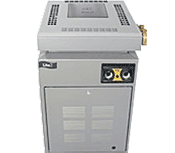.jpg)
14 kW
69kW

Comparative Costs, Auckland Region, six months swimming season, pool 28oC, thermal retention cover
A 14 kW Heat Pump is an 'incremental' heating device: it takes water from the pool. and using 2.6 kW of electricity adds a small amount of heat which is extracted from the 'ambient atmosphere' ie there is always some ambient heat available right down to Zero degrees C.
This means the unit must be 'On' for the whole six months, and the integral Temperature Setting set to your desired level. The Heat Pump is running an electrical pump which pressurises gas which when it is allowed to expand, uses the heat produced to warm the pool water through an intercooler device. In this way a lesser amount of electricity can be mulitplied to create the effect of a greater amount. A 2.6 kW input device will effectively act as a 14 kW heater.
This effect is known as the COP (coefficient of performance) which in this case is 5.38 (or the output is 5.38 times the input). The nature of incremental heating is that it is generally a lower running cost device.
A 69 kW Gas heater is a different proposition: Pool water is passed through a Heat Exchanger which is directly heated by the combustion of the Gas. The effect is that the water is 'instantly' heated, producing hot water in the range 38oC to 42oC. A 50 kL pool that starts at 18oC (early spring average) will achieve 28oC in less than 10 hours - an average of 1oC each hour.
Once the required temperature of 28oC has been reached, the heater (as with the Heat Pump) will be controlled by a thermostat, so this heater is also left 'On' for the swimming season. Due to the brute froce natuer of gas heating, longer swimming seasons can be accomplished, but at a considerable increase in running costs, but nevertheless the potential is there.
Gas Heaters are cheaper to buy (but can cost much more to install as a Gas Heating Company must hook up the pipework - and in older homes the incoming household gas line might have to be upgraded from older small diameters to a modern 25mm line)
Summary:
Heat Pumps cost more to buy, are cheaper to install, and in the long run, cheaper to operate.
Gas heaters are more costly to run, but might suit the user who only heats the pool - for example - on weekends, as a Gas Heater switched on on Friday morning will have a 28oC ready pool for Saturday swimming, and can be switched off again on Sunday morning.